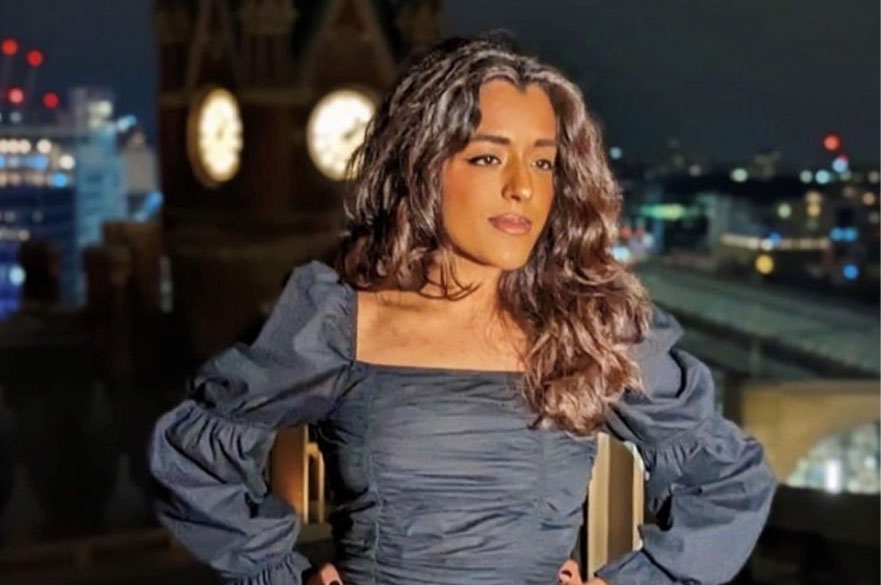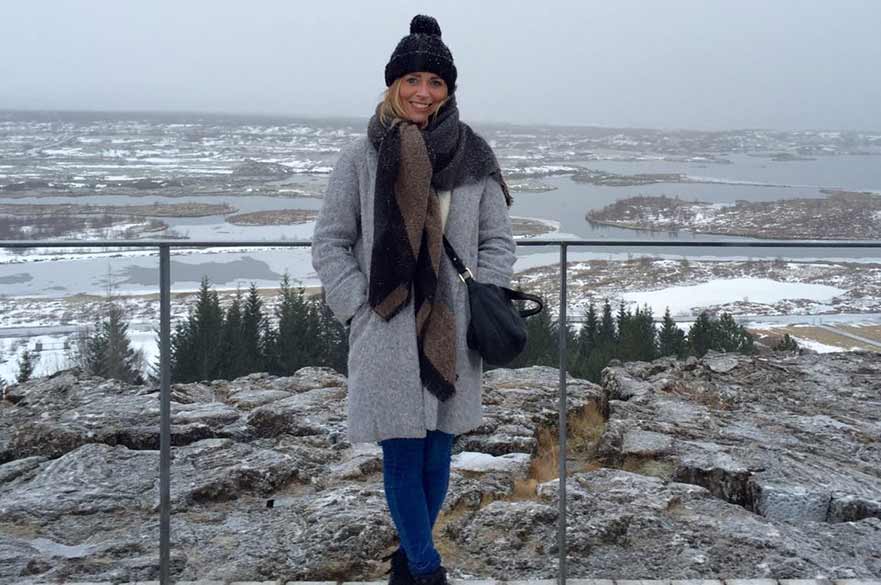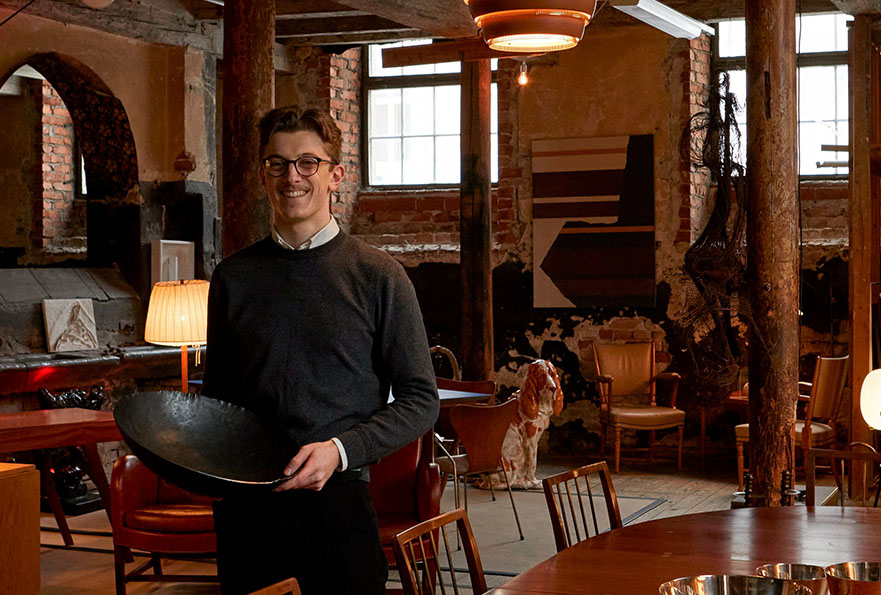
My creativity was sparked and I was really pushed to think critically and develop processes that I continue to use every day in my work.
More about Arooj
Arooj has been listed by Vogue Business as a top 100 Innovator for her work as a next-gen entrepreneur and agitator overhaling the fashion industry – this is an incredible achievement for this class of 2018 Fashion Communication and Promotion BA (Hons) graduate and Arooj makes us all #ProudtobeNTU.
We are delighted to chat to Arooj about how her studies have contributed to her career successes. It is also inspiring to hear Arooj talk candidly about overcoming the challenges she has faced: she is living with neurofibromatosis (NF) type 1, she has refused to be pigeon-holed in the ‘diversity box’ - and she is showing her family that being creative can make big waves!
Why did you decide to study Fashion Communication and Promotion BA (Hons) at NTU?
For me, it was all about fashion, fashion, fashion. I couldn't get fashion out of my head - it was all I could think about.
I did an art foundation course and recognised that, although I was creative and had a knack for the thought process of design, I didn’t want to do a pure design course. I therefore did lots of research about my options for courses and universities. I was drawn to NTU because it had more to offer than other universities - the Fashion Communication and Promotion course and NTU just seemed perfect. Nottingham is not too far from London and ‘all things fashion’ that can be found there, I could also get home to Bradford in just a couple of hours if I needed to. The reviews, the profiles on the website, and the successful graduates of the fashion courses all confirmed that this was the place for me.
When I applied and received an offer, I was absolutely over the moon!
Did the course deliver everything you expected it to?
The course was incredible. Looking back, I can see that the course was everything I wanted and more. My creativity was sparked and I was really pushed to think critically and develop processes that I continue to use every day in my work.
I specifically recall using the Fashion Communication and Promotion process to create campaigns celebrating diversity, this has been invaluable in my career. Without this process, my campaigns and consulting work would not have been as successful as they are today. The course taught me to communicate effectively and connect with different audiences, this has been a game-changer for me.
I loved the course so much that I'll be shouting about it for a very, very long time! My passion for the course is the reason why I was so determined to stay on at Uni and complete my degree after I was diagnosed with the painful and disfiguring condition, neurofibromatosis (NF) type 1.
And what about outside of your studies, what are your memories of NTU?
My time at NTU was a life-changing experience that allowed me to develop my personality and become more independent. University was definitely a pivotal point for me.
In school, I was never very good at academic subjects like maths, English and science. My twin sister, on the other hand, excelled in those areas. I come from a very supportive family, but we were constantly compared and I faced the challenge of not being taken seriously, or at least that’s how I perceived it - I was seen as just the ‘creative one’, my sister was the ‘clever one’. However, things started to change when I went to university, a year after my twin, due to my art foundation course – my confidence increased and I learnt to be proud of my own talents and individuality.
Initially, my transition into university life wasn’t easy, it was all a bit of a culture shock and I didn’t feel like I fitted in. I struggled at first to find my network and create my own community. However, my passion for the course kept me going and, although it took me a while, I made some incredible friends who are still in my life.
What did you do at NTU to prepare for the world of work?
I blogged, I attended fashion events, I made connections with agencies and industry players. Manchester was my focus at that time because it was cheaper to get there than London. I connected with the Manchester fashion industry and built a following on Instagram. I grew my connections so I could use these people in my final year when I did my dissertation - I didn't do this transactionally, but from the heart because I loved it. I wrote for free sometimes to add to my portfolio and build connections.
Can you talk us through your career journey since you graduated?
My first job was in the modelling industry, where I was marketing and scouting for an agency in Manchester. Next, I moved to London where I worked for an international company opening a UK office – this didn’t last too long as the global pandemic hit and I was made redundant.
I had always wanted to work for myself so I took this as an opportunity to really get going with my freelance work, and in 2020 I created #DoneWithDiversity.
I work in both front-facing and behind-the-scenes capacities, where I meet with clients as talent for their campaigns or conduct workshops and talks. For the front-facing work, I focus on storytelling, such as my recent project with Microsoft, which is my fifth campaign with them. In this project, I discuss how I use Microsoft in my day-to-day work, including the illustrations and typography created on Microsoft devices.
You’ve been creating big waves overhauling the fashion industry with your work with #DoneWithDiversity – can you tell us more about this?
I feel compelled to challenge tokenism within the fashion industry, hence #DoneWithDiversity was born. I’m fighting for the word ‘diversity’ to be ditched, it’s unhelpful - it’s just a buzzword which allows brands to tick a few boxes, and we can become more inclusive without it.
I have had personal experience of being the tick in the diversity box. I have often been the only brown face in entirely white teams who don’t understand the culture or community. Brands need to look beyond surface appearances and understand that there is so much more going on than just skin colour – they need to stop generalising and recognise that diversity campaigns don’t work if there’s no representation behind the scenes.
#DoneWithDiversity also directs a spotlight on language more generally, and how it makes non-disabled, heterosexual white cis men and women look like the norm, with anyone who doesn’t fit the status quo being pigeon-holed within the diversity box.
You’ve had to overcome a lot of challenges including being diagnosed neurofibromatosis (NF) type 1 when you were at NTU - can you explain how the condition has impacted you?
It was extremely challenging. The condition is painful and disfiguring and my doctors were worried, understandably so. My family wanted to me take a break from my studies to focus on my health but I didn’t want to delay, I was determined not to stop until was physically unable to walk.
I spoke to my tutors and told them about my diagnosis, but I didn't want any special treatment or extensions. I just wanted to be treated normally and get it my final year done. And I did it! I pushed myself really hard and got a first-class degree.
During this time, I was also the subject of a BBC documentary, “My Tumour Made Me Trendy’’. When I subsequently turned down modelling jobs for tight clothing, including swimwear, I was criticised for not being body-positive - there was no understanding that I choose to wear loose and androgynous clothing to cover my tumours, or that my style is influenced by my identity. And also, I cannot swim!
I truly believe this experience of living with NF has made me stronger - it has also motivated me to speak up for change.
What advice would you give to current students wanting to break into the creative sector?
I’d say that talent can get you far, but personality gets you everywhere. You should be true to yourself and tell your own story. When I’m looking to work with people, I want to know what they are doing outside of the course – this tells me more about that person and whether we'll work well together.
Everyone at NTU would like to congratulate you on becoming a Vogue Business top 100 Innovator – and we’d also like to know what this recognition means to you?
Thank you, I really do appreciate the warmth of support I am still receiving from NTU.
I’ve been really humbled by the Vogue Business listing – I’m still pinching myself that it’s actually happened. I’m seeing it as a steppingstone, not a milestone – it’s just amazing that my work has been recognised in this way and I want to use it to do more and continue to be an advocate for change.
Are you a member of the NTU alumni and supporter community?
Update your details now and stay connected with our latest news and events and gain access to a wide range of exclusive benefits and services.
Still need help?
-

STUDENT PROFILE
Abi Emmerson
Fashion ManagementUnited Kingdom
https://www.ntu.ac.uk/study-and-courses/courses/our-students-stories/art-design/abi-emmerson
-

STUDENT PROFILE
Abigail Coop
Fashion Knitwear Design and Knitted TextilesUnited Kingdom
https://www.ntu.ac.uk/study-and-courses/courses/our-students-stories/art-design/abigail-coop
-

STUDENT PROFILE
Adam Wolstenholme
BA (Hons) Product DesignUnited Kingdom
https://www.ntu.ac.uk/study-and-courses/courses/our-students-stories/architecture-design-built-environment/adam-wolstenholme